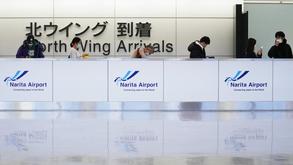 Passengers wait in line before moving onto their temporary housing for quarantine as they come out of an arrival gate for international flights at the Narita International Airport in Narita, east of Tokyo, on Dec 2, 2021. (HIRO KOMAE / FILE / AP)
Passengers wait in line before moving onto their temporary housing for quarantine as they come out of an arrival gate for international flights at the Narita International Airport in Narita, east of Tokyo, on Dec 2, 2021. (HIRO KOMAE / FILE / AP)
SEOUL / HANOI / SINGAPORE / JERUSALEM / TOKYO / WELLINGTON / CANBERRA / MANILA - Japan said on Tuesday it would start conducting "test tourism" in the form of limited package tours in May as a way of gathering information prior to a full re-opening of the country to tourism.
Though tourism was a major pillar of Japan's economy, tourists have not been permitted to enter since it adopted strict border controls in 2020 at the start of the coronavirus pandemic.
Regulations have been loosened slightly to allow students and some business travelers to enter. But, individual tourists remain barred despite calls from industry leaders hoping to restart tourism to take advantage of the yen, which has fallen to 20-year lows.
The Tourism Agency said on Tuesday that it would start allowing small group tours to enter from later this month as "test cases" to gain information for a broader resumption of tourism at an unspecified future date.
Tourists who have been triple-vaccinated and come from the United States, Australia, Thailand and Singapore will be allowed to take part in the tours, which will be strictly planned in conjunction with travel agencies and accompanied at all times by tour conductors, it added in a statement.
In 2019, Japan hosted 31.9 million foreign visitors, who spent 4.81 trillion yen.
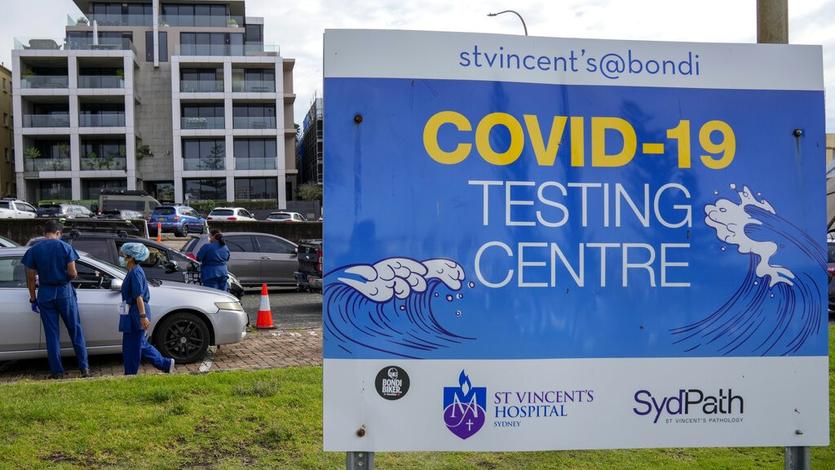 Staff check a client at a drive-through COVID-19 testing clinic at Bondi Beach in Sydney, Australia on Jan 8, 2022. (MARK BAKER / AP)
Staff check a client at a drive-through COVID-19 testing clinic at Bondi Beach in Sydney, Australia on Jan 8, 2022. (MARK BAKER / AP)
Australia
The number of Australians taking precautions against the spread of coronavirus has fallen amid a surge in cases.
According to data published by the Australian Bureau of Statistics (ABS) on Tuesday, 78 percent of Australians reported wearing a face mask in the week prior to being surveyed in April, down from 98 percent in February.
The portion of respondents who said they were physically distancing themselves from others fell from 85 to 75 percent and 92 percent said they were washing or sanitizing their hands regularly, down from 95 percent.
According to Department of Health data there were nearly 1.4 million new COVID-19 cases reported in Australia in April and more than 800 deaths.
It represents almost one quarter of the 5.8 million total cases recorded in Australia to the end of April and more than 10 percent of the country's pandemic deaths.
The ABS survey found 62 percent of households had undertaken at least one COVID-19 test in the previous four weeks, up from 46 percent in March.
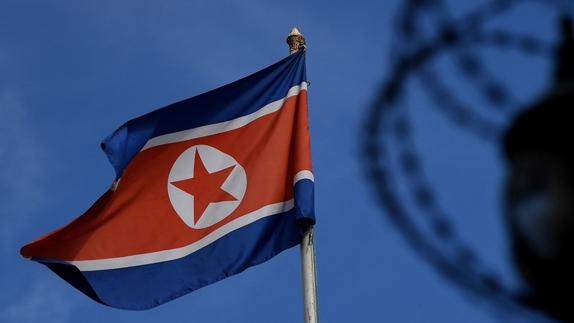 In this file photograph dated March 27, 2017, the flag of the Democratic People's Republic of Korea is seen past the barbed wire fencing of the country's embassy in Kuala Lumpur. (MANAN VATSYAYANA / AFP)
In this file photograph dated March 27, 2017, the flag of the Democratic People's Republic of Korea is seen past the barbed wire fencing of the country's embassy in Kuala Lumpur. (MANAN VATSYAYANA / AFP)
Democratic People's Republic of Korea
The Democratic People's Republic of Korea has mobilized its military to distribute COVID medications and deployed more than 10,000 health workers to help trace potential patients as it fights a sweeping coronavirus wave, state media KCNA said on Tuesday.
The state emergency epidemic prevention headquarters reported 269,510 more people with fever symptoms, bringing the total to 1,483,060, while the death toll grew to 56 as of Monday evening, KCNA said.
"A powerful force" of the army's medical corps was immediately deployed to improve the supply of medicines in the capital Pyongyang, the centre of the epidemic, following an order by leader Kim Jong Un, KCNA reported.
The team's mission was aimed at "defusing the public health crisis" in Pyongyang, it said
Some senior members of the ruling Workers' Party's powerful politburo visited pharmacies and medicine management offices to check supply and demand, KCNA said in another dispatch.
"They called for establishing a more strict order in keeping and handling the medical supplies, maintaining the principle of prioritizing the demand and convenience of the people in the supply," KCNA said.
Tracing efforts were also intensified, with some 11,000 health officials, teachers and medical students joining an "intensive medical examination of all inhabitants" across the country to locate and treat people with fever.
Still, various sectors of the national economy are maintaining production and construction, while taking thorough anti-virus measures, KCNA added. Kim had ordered that limited activity be allowed in each city and county.
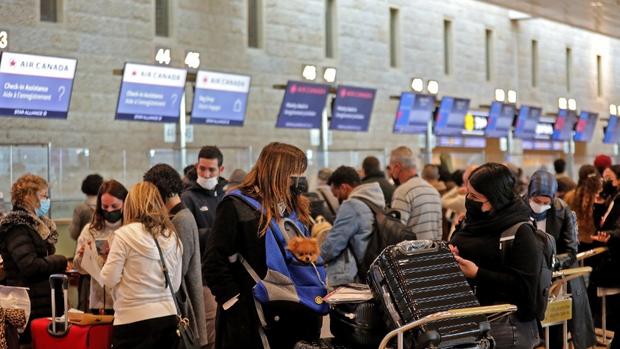 Travelers queue with their luggage at the check-in counter ahead of their departing flights at Israel's Ben Gurion Airport in Lod, east of Tel Aviv, on Dec 21, 2021. (GIL COHEN-MAGEN / AFP)
Travelers queue with their luggage at the check-in counter ahead of their departing flights at Israel's Ben Gurion Airport in Lod, east of Tel Aviv, on Dec 21, 2021. (GIL COHEN-MAGEN / AFP)
Israel
Foreign nationals flying to Israel will no longer be required to take a coronavirus test before boarding, the Israeli Ministry of Health said on Monday.
Earlier this month, the ministry allowed foreigners to choose between PCR and antigen tests before boarding, instead of mandatory PCR only. The latest decision, however, cancels any testing requirement.
The easing will take effect on Saturday.
All passengers flying to Israel will still be required to fill out a health declaration up to 48 hours before boarding, the ministry noted.
Another obligation that will be abolished is the coronavirus test that has to be taken before boarding a cruise ship departing from Israel, it added.
New Zealand
New Zealand recorded eight more deaths and 9,843 new community cases of COVID-19, the Ministry of Health said on Tuesday.
Among the new community infections, 3,442 were reported in the largest city Auckland, the ministry said in a statement.
In addition, 63 new cases of COVID-19 were detected at the New Zealand border.
 A child receives the Pfizer-BioNtech COVID-19 vaccine for children aged 5-11 as a performer dressed as superhero character Spider-Man looks on at a gym in San Juan City, suburban Manila on Feb 7, 2022. (TED ALJIBE / AFP)
A child receives the Pfizer-BioNtech COVID-19 vaccine for children aged 5-11 as a performer dressed as superhero character Spider-Man looks on at a gym in San Juan City, suburban Manila on Feb 7, 2022. (TED ALJIBE / AFP)
Philippines
The Philippines' Department of Health confirmed on Tuesday local transmission of the highly transmissible Omicron BA.2.12.1 subvariant of COVID-19 in the Southeast Asian country.
Health Undersecretary Maria Rosario Vergeire said that local clusters of the BA.2.12.1 variant infection have been detected in Metro Manila, the Western Visayas region in the central Philippines, and Puerto Princesa city in Palawan province.
"It means that the cases we detected in these areas are not linked to imported cases," Vergeire told a virtual media briefing.
The Philippines has detected 17 BA.2.12.1 cases so far.
"Now that we have local transmission of Omicron BA.2.12.1, we must act fast," Vergeire said, urging local government units to "actively look for cases and immediately isolate" suspected cases.
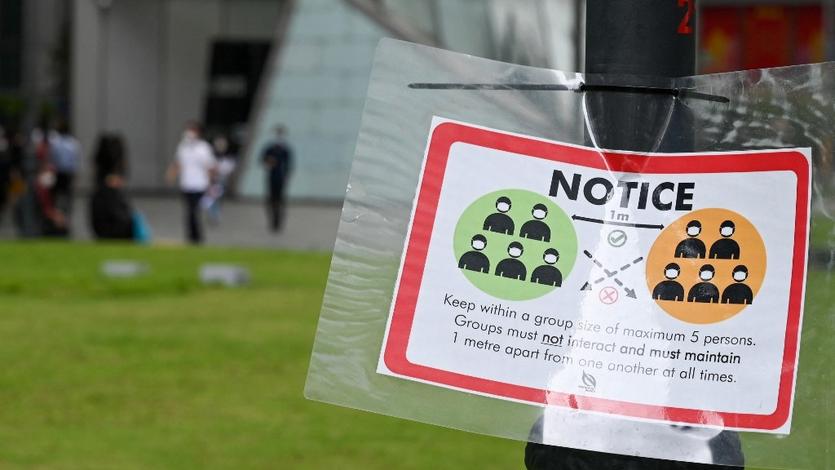 A notice warning people not to gather in groups larger than five persons as part of restrictions to hald the spread of the coronavirus is displayed at Raffles Place financial business district in Singapore on Jan 4, 2022. (ROSLAN RAHMAN / AFP)
A notice warning people not to gather in groups larger than five persons as part of restrictions to hald the spread of the coronavirus is displayed at Raffles Place financial business district in Singapore on Jan 4, 2022. (ROSLAN RAHMAN / AFP)
Singapore
Singapore has detected its first community cases confirmed to be infected with the Omicron BA.4 and BA.5 subvariants of COVID-19, the Ministry of Health said in a press release Monday.
The ministry reported two local COVID-19 cases infected with the BA.4 variant, and one local case infected with the BA.5 variant. All cases are fully vaccinated, and had earlier received their booster dose. They were either asymptomatic or had mild symptoms such as fever, cough, runny nose and sore throat, and did not require hospitalization.
The ministry said it will step up local surveillance efforts and continue monitoring the spread of the BA.4 and BA.5 variants in Singapore.
Three more deaths were reported from the pandemic in the Southeast Asian country, bringing the death toll to 1,366.
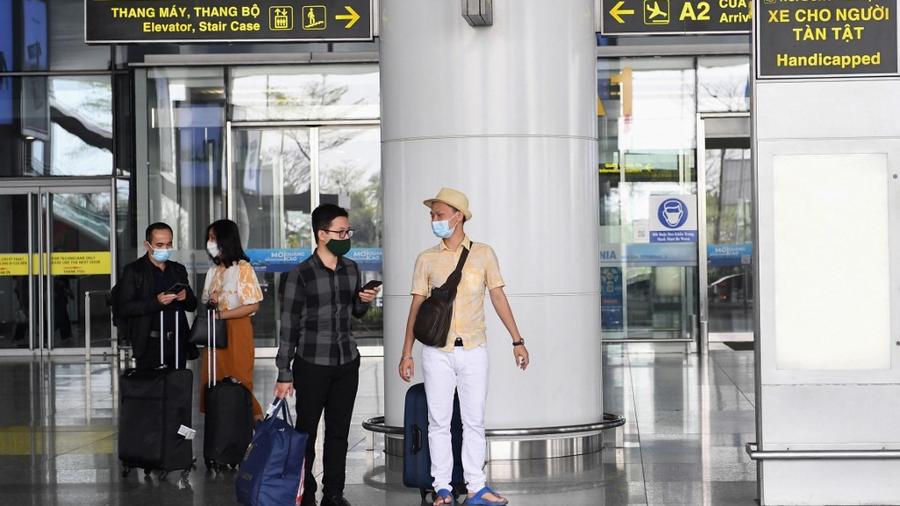 Passengers wait for transportation outside the arrival hall of Noi Bai International Airport in Hanoi on March 15, 2022, as Vietnam announced the return of a visa exemption policy for 13 countries in an effort to kickstart its tourism sector. (NHAC NGUYEN / AFP)
Passengers wait for transportation outside the arrival hall of Noi Bai International Airport in Hanoi on March 15, 2022, as Vietnam announced the return of a visa exemption policy for 13 countries in an effort to kickstart its tourism sector. (NHAC NGUYEN / AFP)
Vietnam
Vietnam recorded 1,550 new COVID-19 cases on Monday, down by 46 from Sunday, according to its Ministry of Health.
Among the new infections, only two were imported and the rest were domestically transmitted in 48 provinces and cities.
The infections brought the total tally to 10,698,180 with 43,067 deaths.


